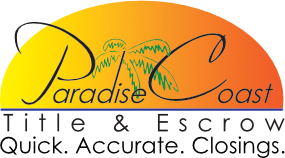– A –
Abstract of Title
A condensed history or summary of all transactions affecting a particular tract of land.
Acceleration Clause
A clause in a mortgage that allows the lender to demand payment of the outstanding loan balance for a variety of reasons including defaults on the loan or title transfers to another individual without consent of the lender.
Access
The right to enter and leave a tract of land from a public right-of-way. Can include the right to enter via access of the lands belonging to a third party.
Acknowledgment
The act by which someone executing a legal document goes before an authorized officer or notary public and declares it to be his or her voluntary act and deed.
Acre
A tract of land containing 43,560 square feet.
Administrator
A person appointed by a probate court to settle the affairs upon the death of an individual who has no will.
Adjustable-Rate Mortgage
Adjustable-Rate Mortgages (ARM’s) are mortgages in which the interest rate and monthly payment will change periodically.
Adjustment Date
The date the interest rate changes on an adjustable-rate mortgage (ARM).
Affidavit
A sworn statement in writing.
Agent
A person or company that has the power to act on behalf of another or to transact business for another
Air Rights
The right to ownership of everything above the physical surface of the land.
Amortization
A loan payment consists of a portion which will be applied to pay the accruing interest on a loan, with the remainder being applied to the principal. Over time, the interest portion decreases as the loan balance decreases, and the amount applied to principal increases so that the loan is paid off (or amortized).
Amortization Schedule
A table which shows how much of each payment will be applied toward principal and how much toward interest over the life of the loan. It also shows the gradual decrease of the loan balance until it reaches zero.
Amount Financed
This figure is used to calculate your APR. It represents your loan amount minus any prepaid finance charges assuming you kept the loan to maturity and made only the required monthly payments.
Annual Percentage Rate (APR)
The Annual Percentage Rate (referred to as the “APR”) encompasses both the interest and any additional costs or prepaid finance charges such as prepaid interest, private mortgage insurance, closing fees, points, etc.
Application Fee
A fee charged for accepting and reviewing a loan application.
Appraisal
A written analysis of the estimated value of a piece of property (or home) prepared by a qualified appraiser.
Appraisal Fee
A fee paid to an appraisal company that objectively determines the fair market value of your property. This fee varies based on the location and type of property.
Appraised Value
An opinion of a property’s fair market value, based on an appraiser’s knowledge, experience, and analysis of the property.
Appraiser
An individual qualified by education, training, and experience to estimate the value of real and personal property.
Appreciation
The increase in the value of a property due to changes in market conditions, inflation, or other causes.
ARM
Adjustable Rate Mortgage. Also known as a “Variable Rate Mortgage.”
Assessed Value
The valuation placed on property by a public tax assessor for purposes of taxation.
Assessor
A public official who evaluates property for the purpose of taxation.
Assignee
One to whom a transfer of interest is made. For example, the assignee of a mortgage or contract.
Assignment
When ownership of a mortgage is transferred from one company or individual to another, it is called an assignment.
Assignment Recording Fee
In some cases, after a loan is closed, it is transferred to a specialized loan servicer who handles the collection of monthly payments. The Assignment Fee covers the cost of recording this transfer at the local recording office.
Assumable Mortgage
A mortgage which, by its terms, allows a new owner to take over its obligations.
Assumption
The term applied when a buyer assumes the seller’s mortgage.
Attachment
Legal seizure of property to force payment of a debt.
– B –
Balloon Mortgage
A mortgage that is amortized over a specific time period, but requires a lump sum payment in full at an earlier date.
Balloon Payment
The final lump sum payment that is due upon the termination of a balloon mortgage.
Bankruptcy
A federal court proceeding in which debtors are relieved of liability for their debts after surrender of their assets to a court appointed trustee. The most common type of bankruptcy for an individual is a “Chapter 7” bankruptcy which relieves the borrower of most of his or her debts. A borrower cannot usually qualify for an “A” paper loan for a period of two years after the bankruptcy has been discharged and requires the re-establishment of an ability to repay debt.
Biweekly Mortgage
A mortgage in which payments are made every two weeks instead of once a month thereby substantially reducing the time it takes to pay off a thirty year mortgage.
Bond Market
Usually refers to the daily buying and selling of 30-year treasury bonds. Lenders follow this market intensely because as the yields of bonds go up and down, fixed rate mortgages do approximately the same thing.
Broker
A broker is anyone who acts as an agent, bringing two parties together for any type of transaction and earns a fee for doing so.
Buydown
Usually refers to a fixed rate mortgage where the interest rate is “bought down” for a temporary period, usually one to three years.
– C –
Cap
Adjustable Rate Mortgages have fluctuating interest rates, but those fluctuations are usually limited. How much the loan can adjust over a six month period, an annual period, and over the life of the loan, and are referred to as “caps.” Some ARMs, although they may have a life cap, allow the interest rate to fluctuate freely, but require a certain minimum payment that adjusts only once a year.
Carry Back
In order to sell his home, a seller may be willing to “carry back” a second trust deed/mortgage. The major reason for obtaining a “seller carry back” is that the lower loan-to-value ratio on the first mortgage will make it easier to qualify for the loan, and there will be no need for mortgage insurance.
Cash-Out Refinance
When a borrower refinances his mortgage at a higher amount than the current balance of the loan, it is referred to as a “cash out refinance.”
Certificate of Deposit Index
One of the indexes used for determining interest rate changes on some adjustable rate mortgages. It is an average of what banks are paying on certificates of deposit.
Certificate of Eligibility
A document issued by the Veterans Administration that certifies a veteran’s eligibility for a VA loan.
Certificate of Reasonable Value (CRV)
After an appraisal has been performed on a property purchased with a VA loan, the Veterans Administration issues a CRV.
Chain
A term of land measurement that is 66 feet in length.
Chain of Title
A term applied to the past series of transactions and documents affecting the title to a particular tract of land.
Clear Title
A title that is not encumbered by liens or legal questions.
Closing
Also known as “escrow” or “settlement.” The process of executing legally binding documents, such as deeds and mortgages, most commonly associated with the purchase of real estate and the borrowing of money to assist in that purchase.
Closing Costs
For closing costs, a lender makes an attempt to estimate the amount of non-recurring closing costs (items paid only once) and prepaid items (such as property taxes or insurance) on the Good Faith Estimate which they must issue to the borrower within three days of receiving a home loan application.
Closing Statement
See Settlement Statement.
Clouded Title
An encumbered title many times in which cannot be removed except by deed, release or court action.
Commitment to Insure
A report issued by a title insurance company, or its agent, committing the title insurance company to issue an insurance policy.
Common Interest Community (CIC)
Ownership characterized by mutual ownership of common areas, either jointly or through membership in an association such as a condominium, planned unit development, or townhome.
Condemnation
Taking private property for public use through court proceedings.
Conditions and Restrictions
A common term used to designate conditions and restrictions on the use of land. Includes penalties for failure to comply.
Condominium
A system of individual fee ownership of units in a multi-unit building, combined with joint ownership of common areas of the structure and land.
Condominium Conversion
Changing the ownership of an existing building (usually a rental project) to the condominium form of ownership.
Condominium Hotel
A condominium project that has rental or registration desks, short-term occupancy, food and telephone services, and daily cleaning services and that is operated as a commercial hotel even though the units are individually owned.
Construction Loan
A short-term, interim loan for financing construction costs wherein a bank makes payments to the builder at periodic intervals as work takes place.
Contingency
A condition that must be met before a contract is legally binding.
Contract for Deed
An agreement to sell and purchase wherein title is held as security by the seller, until all required payments to the seller have been completed.
Conventional Mortgage
Refers to home loans other than government loans (VA and FHA).
Convertible ARM
An adjustable-rate mortgage that allows the borrower to change the ARM to a fixed-rate mortgage.
Convey
The act of deeding or transferring title to another.
Cooperative
A residential multi-unit building owned by a corporation in which each unit is occupied by a member of the corporation.
Cost of Funds Index (COFI)
One of the indexes that is used to determine interest rate changes for certain adjustable-rate mortgages. It represents the weighted-average cost of savings, borrowings, and advances of the financial institutions such as banks and savings & loans.
Covenant
An agreement written into deeds and other instruments promising performance or non-performance of certain acts, or stipulating certain uses or non-uses of the property.
Credit Report
On every loan transaction order a credit report is ordered to determine past credit history and a borrower’s liabilities.
– D –
Deed
A written document by which the ownership of land is transferred from one person to another.
Deed-In-Lieu
Short for “deed in lieu of foreclosure,” this conveys title to the lender when the borrower is in default and wants to avoid foreclosure. The lender may or may not cease foreclosure activities if a borrower asks to provide a deed-in-lieu.
Default
Failure to make the mortgage payment within a specified period of time. For first mortgages or first trust deeds, if a payment has still not been made within 30 days of the due date, the loan is considered to be in default.
Delinquency
Failure to make mortgage payments when mortgage payments are due. For most mortgages, payments are due on the first day of the month. Even though they may not charge a “late fee” for a number of days, the payment is still considered to be late and the loan delinquent. When a loan payment is more than 30 days late, most lenders report the late payment to one or more credit bureaus.
Delivery
The final and absolute transfer of a deed from seller to buyer in such a manner that it cannot be recalled by the seller. Necessary for a complete transfer of title.
Deposit
A sum of money given in advance of a larger amount being expected in the future. Often called “earnest money deposit.”
Depreciation
A decline in the value of property.
Down Payment
The part of the purchase price of a property that the buyer pays in cash and does not finance with a mortgage. that requires a loan to be paid in full if property is sold or transferred.
– E –
Earnest Money
Advance payment of part of the purchase price to bind a contract for property.
Easement
An interest in land owned by another that entitles its holder to a specific limited use, such as maintaining electric power lines, working on a sewer line or telephone.
Effective Age
An appraiser’s estimate of the physical condition of a building. The actual age of a building may be shorter or longer than its effective age.
Egress
The right to leave a tract of land. Often used interchangeably with “access.”
Eminent Domain
The power of the state to take private property for public use upon payment of just compensation.
Encroachment
A trespass or intrusion onto another’s property, usually by a structure, wall or fence.
Encumbrance
A lien, liability or charge upon a parcel of land.
Equal Credit Opportunity Act (ECOA)
A federal law that requires lenders and other creditors to make credit equally available without discrimination based on race, color, religion, national origin, age, sex, marital status, or receipt of income from public assistance programs.
Escheat
A reversion of property to the state in those cases where an individual dies without heirs, and, in some states, without a will.
Escrow
A pro c e d u re wherein a disinterested third party handles legal documents and funds on behalf of a seller and buyer, and delivers them upon performance by the parties.
Escrow Account
The amount of money paid each month above that of principal and interest. Usually for property taxes and homeowner’s insurance.
Estate
A person’s possessions.
Estimated Closing Fees
An estimate of the fees that must be paid on or before the closing date by the buyer and/or seller for services, taxes and items necessary to obtain a mortgage. These fees will average between 2% and 5% of the loan amount and vary by lender, property location, and type of mortgage.
Eviction
The lawful expulsion of an occupant from real property.
Exclusive Listing
A written contract that gives a licensed real estate agent the exclusive right to sell a property for a specified time.
Exception
In legal descriptions, that portion of land to be deleted or excluded. The term often is used in a different sense to mean an objection to title or encumbrance on title.
Executor
A person appointed by the probate court to carry out the terms of a will.
Extended Mortgage
One in which the due date of a mortgage is extended for a longer period, often at a higher interest rate than the original mortgage.
– F –
Fannie Mae
Federal National Mortgage Association (also FNMA) is a private corporation, federally chart e re d to provide financial products and services that increase the availability and affordability of housing by purchasing mortgage loans.
Fair Credit Reporting Act
A consumer protection law that regulates the disclosure of consumer credit reports by consumer/credit reporting agencies and establishes procedures for correcting mistakes on one’s credit record.
Federal Housing Administration (FHA)
An agency of the U.S. Department of Housing and Urban Development (HUD) that insures residential mortgage loans made by private lenders.
Federal Housing Administration (FHA) Guarantee
An insurance contract in which HUD through FHA insures that the named lender will recover a specific percentage of the loan amount from the insurer (FHA) in the event that the loan goes bad.
Filing Fees
The amount charged by public officials in your area for recording your mortgage and other documents.
Firm Commitment
A lender’s agreement to make a loan to a specific borrower on a specific property.
First Mortgage
The mortgage that is in first place among any loans recorded against a property.
Fixed Rate Mortgages
Fixed Rate Mortgages are mortgages on which the same rate of interest is charged for the life of the loan.
Flood Insurance
Insurance that compensates for physical property damage resulting from flooding. It is required for properties located in federally designated flood areas.
Foreclosure
The legal process by which a borrower in default under a mortgage is deprived of his or her interest in the mortgaged property. This usually involves a forced sale of the property at public auction with the proceeds of the sale being applied to the mortgage debt.
Freddie Mac
Federal Home Loan Mortgage Corporation (also FHLMC) is a stockholder owned corporation chartered by Congress that purchases mortgage loans.
– G –
Ginnie Mae
Government National Mortgage Association (also GNMA) is a wholly-owned United States corporation that guarantees privately issued securities backed by pools of mortgages insured by FHA (Federal Housing Administration), FMHA (Farm e r s Home Administration) or VA (Veterans Administration).
Government Loan (Mortgage)
A mortgage that is insured by the Federal Housing Administration (FHA) or guaranteed by the Department of Veterans Affairs (VA) or the Rural Housing Service (RHS). Mortgages that are not government loans are classified as conventional loans.
Graduated Payment Mortgage
A loan in which monthly payments are relatively small in the beginning and gradually increase in dollar amount over the life of the mortgage.
Guideline Ratios
There are two guideline ratios used in qualifying for a mortgage. The first is called the front-end ratio, or top ratio, and is calculated by dividing total monthly mortgage payment by gross monthly income. (Typically, no larger than 28%.) The second is called the back-end, or bottom ratio, and is equal to total monthly mortgage payment plus total monthly debt divided by gross monthly income. (Typically, no larger than 36%.)
– H –
Hazard Insurance
Insurance coverage in the event of physical damage to a property from fire, wind, vandalism, or other hazards.
Heir
One who might inherit or succeed to an interest in land of an individual who dies without leaving a will (intestate).
Home Equity Conversion Mortgage
A reverse or reverse annuity mortgage in which HUD through FHA guarantees that the borrower will receive monthly payments from the insurer (FHA) in the event the lender is unable to make payments to the borrower.
Home Equity Line of Credit
A mortgage loan, usually in second position, that allows the borrower to obtain funds drawn against the equity of the home.
Home Inspection
An inspection by a professional that evaluates the structural and mechanical condition of a property.
Home Repair Loan
Used for repairs and additions to existing structures without affecting the existing mort g a g e . Typically 10 years or less in length.
Homeowners’ Association
A nonprofit association that manages the common areas of a planned unit development (PUD) or condominium project.
Homeowners Insurance
Homeowners insurance is required by all lenders to protect their investment, and must be obtained before closing. In most cases, coverage must be equal to the loan balance, or the value of the home.
Homeowner’s Warranty
A type of insurance often purchased by homebuyers that will cover repairs to certain items, such as heating or air conditioning, should they break down within the coverage period.
HUD 1
A form settlement (closing) statement required by the U.S. Department of Housing and Urban Development (HUD) where federally related mortgages are being made on residential properties. It is a balance sheet showing the source of funds and the distribution of funds in connection with the purchase and/or mortgaging of residential property.
– I –
Ingress
The right to enter a tract of land.
Interim Financing
Temporary or short term loans. Often used with new construction. Usually replaced with a permanent long-term mortgage.
Interest Rate Disclosure
A description of the conditions applicable to the processing of a loan as well as the terms of the buyer’s interest rate agreement with the lender.
Intestate
Designates the estate or condition of failing to leave a will at death.
– J –
Joint Tenancy
An estate where two or more persons hold real estate jointly for life.
– K –
There are no items in this category.
– L –
Landmark
Any conspicuous object that helps establish land boundaries.
Lease
A grant of the use of lands for a term of years in consideration of the payment of a monthly or annual rental.
Lender’s Policy
A form of title insurance policy that insures the validity, enforceability and priority of a lender’s lien. Does not provide protection for the owner.
Lender Processing Fee
The lender processing fee covers the cost of analyzing a loan application and compiling and packaging the necessary supporting documentation to close your loan.
Lessee
One who takes lands or properties under a signed lease.
Lessor
One who grants or gives lands or properties under a signed lease.
Lien
A hold, claim, or charge placed by a creditor owed money. Some examples are mortgage liens, judgment liens, mechanics’ liens.
Life Estate
A grant or reservation of the right of use, occupancy and ownership for the life of an individual.
Link
A term of land measurement being 1/100th of a chain or 66/100ths of a foot.
Lis Pendens
A notice recorded in the official records of a county to indicate that a suit is pending affecting the lands where the notice is recorded.
Loss Payable Clause
Provision added to a Fire and Casualty Policy that says any loss will be paid to two or more parties as their interest may appear. Usually the owner and the mortgage lender.
Lot
A part of a subdivision or block with fixed boundaries.
– M –
Majority
The age at which a person is entitled to handle his or her own affairs.
Maximum Cash Out
The maximum amount of money someone is allowed to receive from a mortgage transaction based on the loan information provided and the amount of equity in the home.
Mechanic’s Lien
A lien allowed by statute to contractors, laborers and material suppliers on buildings or other structures upon which work has been performed or materials supplied.
Minor
Someone who (because of insufficient age or status) is legally incapable of making contracts.
Monthly Mortgage Payment
A monthly mortgage payment typically contains three parts called the PITI (principal & interest, taxes, and insurance). For those who pay taxes and insurance separately, they pay only principal and interest to the lender.
Monthly Principal and Interest (P&I) Payment
Principal and interest is the dollar portion necessary to repay the loan. All interest that occurs is calculated on the current balance owed. The principal reduces the remaining balance of a mortgage.
Monument of Survey
Visible marks or indications left on natural or other objects indicating the lines and boundaries of a survey. Ie: posts, pillars, stones, etc. May also be fixed natural objects such as raods.
Mortgage
An legal document used to encumber land as security for a debt.
Mortgage-Backed Security
A security that shows the ownership of an interest in a mortgage loan.
Mortgage Banker
A lender that lends money solely with respect to real estate and secures its loans with mortgages on the real estate.
Mortgage Broker
A person or company that buys and sells mortgages for another on commission or who arranges for and negotiates mortgage contracts.
Mortgagee
The mortgage lender.
Mortgagor
The mortgage borrower.
– N –
Negative Amortization
An increase in the principal amount of a real estate loan due to the addition of matured but unpaid interest to the loan balance. Usually the result of monthly payments that are temporarily set at a lower than needed level.
Note
A legal instrument proving a devt secured by a security instrument such as a mortgage or deed of trust.
– O –
Origination Points
A fee that is charged by the lender to originate a loan. Typically set up as a percentage of the loan amount (i.e. 1% of the loan amount).
– P –
Payment Schedule
Methods for disclosing payment schedules varies by loan type. Fixed rate loans indicates the required monthly payment through the life of the loan. The payment schedule for fixed-rate loans may gradually decrease over time due to a declining insurance premium. For adjustable rate loans, the payment schedules vary by loan type and are based on conservative assumptions of future interest rates.
Personal Representative
A person appointed by the probate court to administer a decedent’s estate. See also “Executor” or “Administrator.”
Planned Unit Development (PUD)
A planned unit development (PUD) is a project or subdivision that consists of common property and improvements that are owned and maintained by an homeowner’s association for the benefit and use of the individual units within the project. For a project to qualify as a PUD, the owners’ association must require automatic, non-severable membership for each individual unit owner, and provide for mandatory assessments.
Plat or Plot
A map representing a piece of land subdivided into lots with streets.
P.M.I. (Private Mortgage Insurance)
An insurance contract that insures that the named lender will recover a specific percentage of the loan amount from the insurer in the event the loan is unpaid.
Points
A one-time fee or paid to a lender to secure a loan.
Policy
A written contract of title insurance.
Policy Owner
The insured on a title insurance policy.
Power of Attorney
A legal document authorizing someopne to act on one’s behalf as his or her agent or attorney.
Prepaid Interest
Prepaid Interest is the interest on a mortgage paid at closing and varies from 0 to 30 days.
Prepayment Penalty
A fee charged if the loan is paid off earlier than the specified term of the loan.
Property Taxes
Taxes assessed on a property by the local government (e.g. city, county, village or township) for services provided to the property owner.
Prorate
To allocate between seller and buyer their proportionate share of an obligation paid or due.
– Q –
Quiet Title
An court action to remove record defects or possible claims of other parties named in the action.
– R –
Real Property
Land, together with fixtures, improvements and appurtenances.
Redeem
The act of buying back lands after a mortgage foreclosure, tax foreclosure, or other execution sale.
Reinsurance
To insure again by transferring to another insurance company all or part of an assumed liability, thus spreading the loss risk any one company has to carry.
REIT
Real Estate Investment Trust. A product of federal tax legislation formed as a business trust, under a special state statute or as a corporation for the purpose of investing in real estate or mortgages on real estate.
Reverse or Reverse Annuity Mortgage
A mortgage for which the borrower pledges home equity in return for (monthly) payments, rather than a lump sum distribution of loan proceeds. Repayment is usually not required until the home is sold or the borrower’s estate is settled. See also “Home Equity Conversion Mortgage.”
Right -of–Way
The right by which one has to pass across the lands of another. Also known as an easement.
– S –
Second Mortgage
A second loan on real estate that already has a mortgage on it. Subordinate to the first mortgage. Usually a shorter term and often with a higher interest rate.
Section or Section of Land
A parcel of land comprising one square mile or 640 acres.
Set Backs
Those lines which delineate the required distances for the location of structures in relation to the perimeter of the property.
Single Family Residence
A residence that houses one family.
Sub-Surface Right
The right of ownership to things lying beneath the physical surface of the property. Mineral rights are sub-surface rights.
Survey
The process of measuring land to determine its size, location and physical description and the resulting drawing or map.
– T –
Tenancy by the Entirety
Ownership by a married couple where each person owns the entire estate, with the survivor taking ownership upon the other’s death.
Tenancy in Common
An estate or interest in land held by two or more people, each having equal rights of possession and enjoyment, but without any right of succession by survivorship between the owners.
Tenant
A person who occupies real property with the owner’s permission.
Title
The evidence by which a person has to the ownership and possession of land. Commonly considered as a history of rights.
Title Company Closing Fee
A fee paid to the title insurance company that conducts a closing and handles the transfer of funds among the parties.
Title Defect
Any legal right held by others to claim property or to make demands upon the owner.
Title Insurance
Insurance against loss or damage resulting from defects or failure of title to a particular piece of property.
Title Insurance Premium
Premiums required by lenders in order to determine that a property is properly owned and not subject to any unacceptable liens.
Title Search
An examination of public records, laws, and court decisions to disclose the true ownership of real estate.
Tract
A parcel of land.
Trust
A property right held by someone as a fiduciary for the benefit of another.
Trustee
A person holding property in trust as a fiduciary for the benefit of another.
– U –
Underwriting Fee
Covers the cost of evaluating a loan package, including credit report and appraisal, to determine whether the lender can approve a loan.
– V –
VA Guarantee
An insurance contract in which the Veterans Administration (VA) insures that the lender will recover a specific percentage of the loan amount from the insurer in the event the loan goes unpaid.
Variable Rate Mortgage
A loan in which the interest rate fluctuates with the cost of funds or some other index.
– W –
Warranty
A promise by the grantor of real property that he or she is the owner and will be responsible to the buyer if title is other than as represented.
Wire Transfer Fee
This fee covers the cost of transfers via the inter-bank wire transfer system.
– X, Y –
There are no items in these categories.
– Z –
Zoning
The right of a municipality to regulate and determine the compatible character and use of property.






About The Author: Paradise Coast Title
More posts by Paradise Coast Title